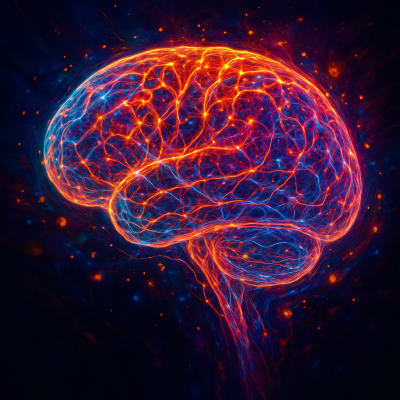Hello, cherished readers of Ambrosia, your editor here, sharing insights for holistic health. We constantly use our brains in this rapidly changing world, processing new information, solving complex problems, and making countless decisions. The brain is our body’s “supreme commander,” the most vital organ that governs our thoughts, emotions, memories, and overall quality of life.
However, unlike physical health, brain health isn’t always easy to perceive. A natural decline in memory or concentration as we age is often considered common. Yet, Ambrosia highlights a crucial truth: the brain is not a static organ; it possesses an astonishing potential for continuous change and growth, known as “Neuroplasticity.” Today, let’s explore Ambrosia’s wise strategies to activate your brain to its optimal state, helping you maintain a vibrant life.

1. Golden Nutrients for Your Brain: A Wise Table for Brain Vitality
Like every other cell in our body, the brain requires specific nutrients to perform at its best. Filling your brain with these “divine nutrients” forms the most fundamental and powerful base for brain activation.
- Omega-3 Fatty Acids: Key Components of Brain Cell Membranes These healthy fatty acids are vital for building brain cell membranes and reducing brain inflammation. DHA, in particular, is essential for brain development and cognitive function, contributing to improved memory and learning abilities.
- Rich Foods: Fatty fish like salmon, mackerel, and tuna; flaxseeds, chia seeds, walnuts, and canola oil.
- Antioxidant Vitamins (C, E) and Flavonoids: Shields for Your Brain The brain is vulnerable to oxidative stress, which can lead to brain cell damage. Vitamins C and E, along with flavonoids, act as powerful antioxidants, helping to protect brain cells and slow cognitive decline.
- Rich Foods (C): Broccoli, bell peppers, kiwi, citrus fruits.
- Rich Foods (E): Nuts (almonds, sunflower seeds), avocado, and vegetable oils.
- Flavonoids: Berries like blueberries and strawberries, dark chocolate, green tea, and red grapes.
- B Vitamins: Essential Co-factors for Brain Energy Metabolism B vitamins are crucial for neurotransmitter synthesis and brain energy metabolism. Specifically, Vitamins B6, B9 (folate), and B12 are important for regulating homocysteine levels, which helps protect both brain and cardiovascular health.
- Rich Foods: Whole grains (brown rice, oats), legumes, spinach, eggs, and meats (chicken, beef).
- Dietary Considerations: Excessive sugar, saturated fats, trans fats, and processed foods can induce brain inflammation and contribute to cognitive decline. It’s best to fill your table with fresh, natural foods as much as possible.
2. Wise Habits and Mental Exercises to Awaken Your Brain
Brain health is not just about eating certain foods; it’s closely linked to our daily habits and mental activities. Wise practices that continuously stimulate and adequately rest your brain are essential for brain activation.
- Regular Physical Exercise: The Wellspring of Brain Vitality Aerobic exercises like walking, jogging, and swimming increase blood flow to the brain, ensuring a steady supply of oxygen and nutrients. They also promote the release of Brain-Derived Neurotrophic Factor (BDNF), which helps with brain cell growth and survival, thereby enhancing memory and learning. Exercise also excels at stress reduction, indirectly supporting brain health.
- Continuous Learning and New Challenges: Strengthening Brain Neural Circuits Engaging in activities that constantly provide new stimuli to the brain—such as learning a new language, playing a musical instrument, solving complex puzzles, or reading—is the most direct way to strengthen neural networks and enhance brain plasticity. Try incorporating small changes and challenges into your daily routine.
- Sufficient, Quality Sleep: The Brain’s Perfect Reset Time Sleep can be thought of as the brain’s “cleaning time.” During sleep, the brain clears out waste accumulated during the day (the glymphatic system), organizes information, and consolidates memories. Chronic sleep deprivation directly leads to impaired brain function, making regular and sufficient sleep an essential condition for brain health.
- Stress Management and Social Connection: The Hidden Keys to Brain Health Chronic stress can have harmful effects on the brain, such as shrinking the hippocampus (the memory center). It’s crucial to find stress-relief methods that work for you, like meditation, mindfulness, or yoga. Furthermore, active social interaction and strong social bonds can help prevent cognitive decline and keep the brain healthy.
- Digital Detox: Relieving Brain Fatigue Excessive use of digital devices can cause brain fatigue and reduce concentration. Periodic digital detoxes or mindful usage habits can provide your brain with rest and strengthen your connection with the real world, positively impacting brain health.
Concluding Thoughts: Nurturing Your Brain Is Nurturing Your Life
Our brain is more than just a physical organ; it’s the core of who we are, determining what we feel, think, and remember. Ambrosia sincerely hopes that by consistently applying the nutritional and lifestyle strategies shared today, your brain will be optimally activated, allowing you to maintain a vibrant and fulfilling life.
May the small, daily practices you adopt build a healthy brain for the future, leading you on an Ambrosia journey toward a clearer and more vital life. Nurturing your brain is, in essence, nurturing your entire life.
[Disclaimer] This blog post is intended for general informational purposes only and does not constitute medical advice. If you have a specific medical condition or health concern, please consult with a qualified healthcare professional for appropriate diagnosis and treatment.
Image generated with DALL·E by OpenAI via ChatGPT.
답글 남기기